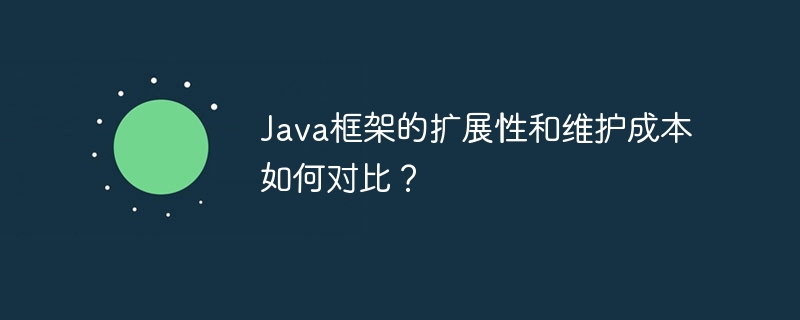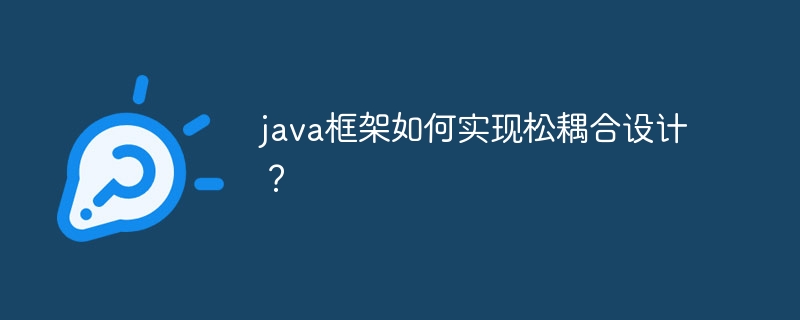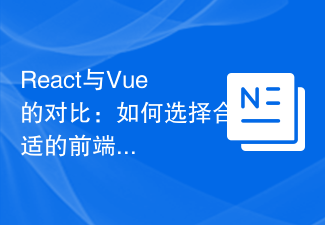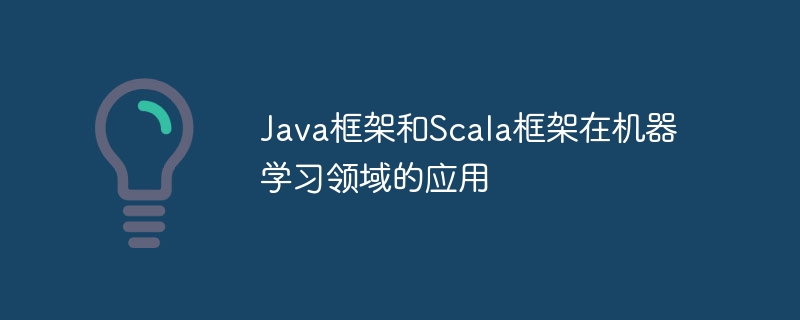In mobile development, Java frameworks provide pre-built components for data access, UI management and network communication, while front-end frameworks such as React Native, Flutter and Ionic are used to build user interfaces to create efficient, responsive and user-friendly Friendly mobile app. Using them together, developers can use Spring Boot to build server-side APIs, Dagger 2 for dependency injection, and React Native to build client-side UIs, or use Ionic or Flutter to build hybrid or native mobile app shells.

Application of Java framework and front-end framework in mobile development
Introduction
With the popularity of mobile devices, mobile development has become a top priority in the software industry. In mobile development, Java and front-end frameworks play a vital role. They provide developers with the tools and technologies necessary to build efficient, responsive, and user-friendly mobile applications.
Java Framework
Java Framework is a set of pre-built components and libraries that simplify the mobile development process. They provide a range of out-of-the-box functionality such as data access, user interface management and network communications. Here are some common Java frameworks for mobile development:
- Android Studio: Google’s official Android development environment with rich features and extensive community support.
- Spring Boot: A lightweight Java framework for quickly building RESTful web services and microservices.
- Dagger 2: A dependency injection framework for simplifying object creation and lifecycle management.
Front-end framework
Front-end framework is a toolkit for building user interfaces for mobile applications. They provide a consistent development experience that enables developers to quickly create beautiful and interactive interfaces. The following are popular front-end frameworks in mobile development:
- React Native: A cross-platform framework developed by Facebook that allows developers to write JavaScript for iOS and Android Native applications.
- Flutter: A cross-platform framework developed by Google for building native applications using the Dart language.
- Ionic: A hybrid framework based on web technologies that allows developers to build applications using HTML, CSS, and JavaScript.
Practical Case
Let us consider an example of building a mobile shopping application using Java framework and front-end framework:
1. Server side:
- Use Spring Boot to build a RESTful API for managing products, orders and users.
- Use Dagger 2 to handle dependency injection.
2. Client:
- Use React Native to build user interface and interaction logic.
- Build hybrid or native mobile app shells using Ionic or Flutter.
By combining Java frameworks and front-end frameworks, you can build an efficient, user-friendly, and scalable mobile application.
Conclusion
Java frameworks and front-end frameworks provide indispensable features for mobile development. By leveraging these tools, developers can quickly build powerful mobile applications that meet the diverse needs of users. As the mobile industry continues to evolve, these frameworks are expected to play an increasingly important role in the future.
The above is the detailed content of Application of Java framework and front-end framework in mobile development. For more information, please follow other related articles on the PHP Chinese website!
 Java大数据处理框架有哪些以及各自的优缺点?Apr 19, 2024 pm 03:48 PM
Java大数据处理框架有哪些以及各自的优缺点?Apr 19, 2024 pm 03:48 PM对于大数据处理,Java框架包括ApacheHadoop、Spark、Flink、Storm和HBase。Hadoop适用于批处理,但实时性较差;Spark性能高,适合迭代处理;Flink实时处理流式数据;Storm流式处理容错性好,但难以处理状态;HBase是NoSQL数据库,适用于随机读写。具体选择取决于数据需求和应用程序特性。
 Java框架的扩展性和维护成本如何对比?May 31, 2024 am 09:25 AM
Java框架的扩展性和维护成本如何对比?May 31, 2024 am 09:25 AM在选择Java框架时,SpringFramework以其高扩展性见长,但随复杂度提升,维护成本也随之增加。相反,Dropwizard维护成本通常较低,但扩展能力较弱。开发者应根据特定需求评估框架。
 java框架如何实现松耦合设计?May 31, 2024 pm 05:57 PM
java框架如何实现松耦合设计?May 31, 2024 pm 05:57 PMJava框架通过采用接口与实现、依赖注入、事件驱动架构和服务定位器模式来实现松耦合设计。这些机制允许组件独立于其实现和直接引用而交互,从而提高了可维护性和可伸缩性。在SpringBootRESTAPI等实战场景中,依赖注入和接口的结合使控制器能够轻松使用UserService的任何实现,而无需硬编码依赖性。
 JPA还是MyBatis:选择合适的ORM工具的准则Feb 22, 2024 pm 09:57 PM
JPA还是MyBatis:选择合适的ORM工具的准则Feb 22, 2024 pm 09:57 PMJPA还是MyBatis:选择合适的ORM工具的准则,需要具体代码示例引言:在现代软件开发中,使用ORM(对象关系映射)工具是非常常见的。ORM工具能够将关系型数据库中的表与对象模型间进行映射,大大简化了开发过程。然而,在选择使用哪个ORM工具时,很多开发者常常感到困惑。本文将讨论如何选择适合的ORM工具,重点比较JPA和MyBatis,并给出具体的代码示例
 React与Vue的对比:如何选择合适的前端框架Sep 26, 2023 am 09:15 AM
React与Vue的对比:如何选择合适的前端框架Sep 26, 2023 am 09:15 AMReact与Vue的对比:如何选择合适的前端框架前端开发中,选择合适的框架对于项目的成功至关重要。在众多的前端框架中,React和Vue无疑是最受欢迎的两个选择。本文将通过对比React和Vue的优缺点、生态系统、性能以及开发体验等方面,帮助读者选择适合自己项目的前端框架。一、React和Vue的优缺点对比React的优点:组件化开发:React将UI拆分为
 PHP中如何进行前端框架和后端框架的集成?May 13, 2023 am 08:06 AM
PHP中如何进行前端框架和后端框架的集成?May 13, 2023 am 08:06 AM随着Web应用程序开发的日益复杂和需要的交互性越来越高,使用前端框架和后端框架已经变得非常普遍。在此过程中,集成前端框架和后端框架也成为必不可少的步骤,以确保应用程序的顺畅运行和高效性能。本文将重点介绍在PHP中如何进行前端框架和后端框架的集成。前端框架和后端框架概述前端框架是一个通用的术语,它指的是应用程序的用户界面和交互功能。HTML,CSS和Java
 深入了解Java框架技术栈:探索Spring MVC、Hibernate、MyBatis等常用Java框架Dec 26, 2023 pm 12:50 PM
深入了解Java框架技术栈:探索Spring MVC、Hibernate、MyBatis等常用Java框架Dec 26, 2023 pm 12:50 PMJava框架技术栈:介绍常用的Java框架,如SpringMVC、Hibernate、MyBatis等随着Java的不断发展,越来越多的框架被开发出来以简化开发过程。其中,SpringMVC、Hibernate、MyBatis等是Java开发中最常用的框架之一。本文将介绍这些框架的基本概念和使用方法,帮助读者更好地理解和应用这些框架。第一,我们来介绍Sp
 Java框架和Scala框架在机器学习领域的应用May 31, 2024 pm 12:43 PM
Java框架和Scala框架在机器学习领域的应用May 31, 2024 pm 12:43 PMJava和Scala语言在机器学习中广泛使用。本文介绍了以下Java和Scala框架:Java:Weka(提供机器学习算法和工具)、H2O(分布式内存内机器学习平台)Scala:SparkMLlib(分布式计算库的一部分,提供机器学习算法)、MLpipe(端到端管道库)这些框架可简化机器学习模型构建、提高训练效率、实现可扩展性和生产部署。选择合适的框架取决于项目需求和应用程序的规模和复杂性。


Hot AI Tools

Undresser.AI Undress
AI-powered app for creating realistic nude photos

AI Clothes Remover
Online AI tool for removing clothes from photos.

Undress AI Tool
Undress images for free

Clothoff.io
AI clothes remover

AI Hentai Generator
Generate AI Hentai for free.

Hot Article

Hot Tools

EditPlus Chinese cracked version
Small size, syntax highlighting, does not support code prompt function

Safe Exam Browser
Safe Exam Browser is a secure browser environment for taking online exams securely. This software turns any computer into a secure workstation. It controls access to any utility and prevents students from using unauthorized resources.

Dreamweaver CS6
Visual web development tools

SublimeText3 Linux new version
SublimeText3 Linux latest version

mPDF
mPDF is a PHP library that can generate PDF files from UTF-8 encoded HTML. The original author, Ian Back, wrote mPDF to output PDF files "on the fly" from his website and handle different languages. It is slower than original scripts like HTML2FPDF and produces larger files when using Unicode fonts, but supports CSS styles etc. and has a lot of enhancements. Supports almost all languages, including RTL (Arabic and Hebrew) and CJK (Chinese, Japanese and Korean). Supports nested block-level elements (such as P, DIV),






